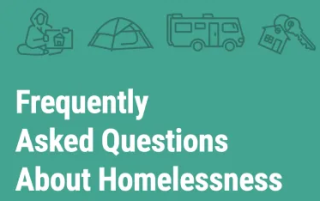FAQ about Homelessness and Encampments in Salem

Why are we seeing encampments?
Like other cities in Massachusetts and across the nation, Salem is experiencing a housing crisis. Our community has only one deed-restricted affordable unit for every four low-income families. The unavailability of housing has led to many being left without a roof over their head. This is exacerbated by two other factors: substance use disorder and addiction, substantially driven by the opioid epidemic, and a mental health crisis, with a major shortage of mental health services, clinicians, and workers. Those living in encampments are often struggling with one or both of these challenges.
Why doesn’t the City just remove the encampments?
In 2019, the 9th Circuit Court of Appeals ruled in Martin vs. City of Boise that “an ordinance violates the Eighth Amendment insofar as it imposes criminal sanctions against unhoused individuals for sleeping outdoors on public property, when no alternative shelter is available to them.” Recently, the Massachusetts Attorney General cited Martin vs. Boise when deciding that the town of Scituate could not enact an ordinance prohibiting people from sleeping in a public parking lot. Because of this, Massachusetts municipalities cannot remove encampments unless there is sufficient “alternative shelter” available within the community. The only overnight shelter in Salem, Lifebridge, currently has no additional capacity.
What role does the Police Department play?
The Salem Police Department includes a Community Impact Unit (CIU), which works on homelessness issues, among many other “quality of life” issues in the community. CIU officers participate in Salem’s Homeless Task Force, in which service providers who work directly with the unhoused meet monthly to coordinate actions and responses.
In addition, over the last three years the Salem Police Department has hired additional mental health clinicians, substance use disorder specialists and peer recovery coaches, and outreach workers.
Officers routinely monitor the areas around an encampment to ensure the area is safe for all. Officers also quickly respond to reports and/or instances of violence. The department encourages all residents, including those living in an encampment, to immediately report violations of the law when they are witnessed.
The enforcement of state and local criminal laws will not result in the long-term dissolution of an encampment, nor is it intended to. It is intended to keep all residents safe. Arresting unhoused individuals does not result in a reduction in a camp’s population.
What role does the Health Department play?
The Health Department inspects encampments and addresses health code violations if observed. The department also participates in the city’s Homeless Task Force, working collaboratively with municipal departments and community partners to assist in finding alternative housing for unhoused individuals. Additionally, the department works to connect individuals facing addiction with available harm reduction tools or assistance with recovery services.
Why can’t the people camping out be placed at emergency shelter sites, like at SSU South Campus?
The emergency family shelter sites are expressly for unhoused families who have enrolled into the Commonwealth’s Department of Housing and Livable Communities (DHLC) emergency shelter system. Many of the individuals living in encampments would be ineligible because they are single individuals and not families. In other cases, they may decline to enroll into the DHLC shelter system. The City and the Commonwealth cannot forcibly enroll or relocate someone simply because they are homeless.
What can the City do?
The City is pursuing three approaches to address the issue of encampments in the community. None will necessarily result in a 100% elimination of encampments immediately; these are longer term approaches that are both legally sound and more likely to result in a sustained and humane solution to the crisis for all involved.
First, the City maintains a “housing first” philosophy in addressing homelessness (more below). Second, the City and its community partners are engaging in continuous outreach to try to develop personal, genuine relationships with those living in an encampment, in order to connect them with the services, supports, and programs that may be able to help them to a more stable and healthy setting. Last, the City is focused on right-sizing the community’s housing supply in the longer term, to meet the needs of those who are living here and struggling to find available, affordable housing.
What is "housing first"?
The philosophy behind housing first is that people struggling with issues like substance use and addiction or behavioral or mental health challenges are much more likely to succeed if they have, first and foremost, a safe place to stay. Since 2020, the City has directed over a quarter million in funding on a Housing First program administrated by North Shore Community Action Programs. That program has successfully placed 36 high risk homeless individuals into housing with supportive services.
How can I help?
Safety is paramount. If you witness an act of violence or another crime at an encampment – or anywhere – please call 9-1-1 immediately. It’s important to report incidents at the time they occur; do not wait until later. If you live in an encampment, please call 9-1-1 immediately if you are in danger.
You can also donate or volunteer to help the numerous community organizations and agencies working to address homelessness. To find out more about the organizations working to help the unhoused in Salem, call the Neighborhood Stability Coordinator at 978-619-5600.
How can I get help?
If you are experiencing housing insecurity or homelessness, the City’s Neighborhood Stability Coordinator may be able to help connect you to services and programs that can assist. Call 978-619-5600 or visit www.salemma.gov/housing for more information. To contact Lifebridge call 978-744-0500 or visit https://lifebridgenorthshore.org/.

